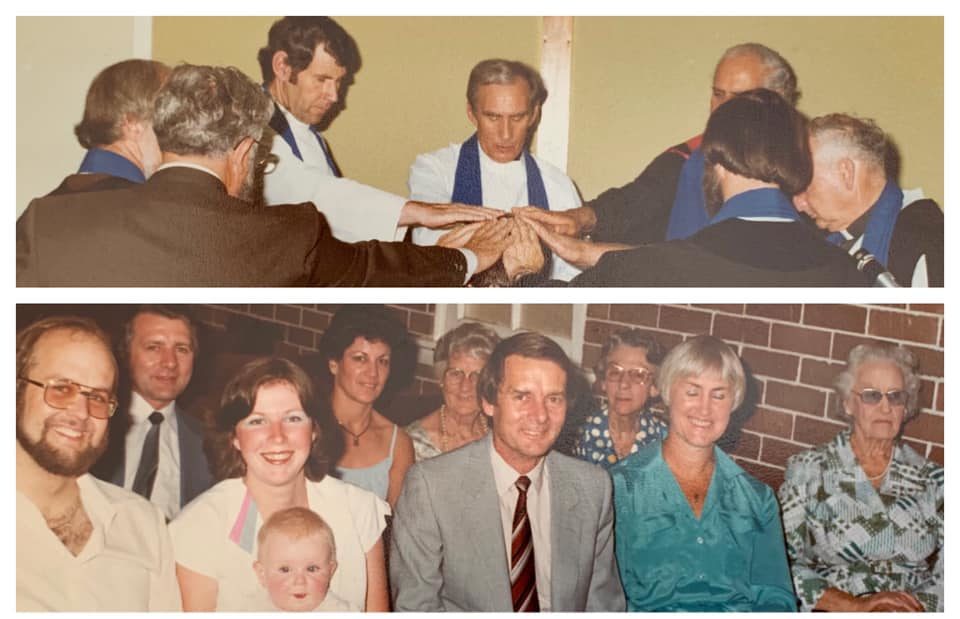A number of Uniting Church ministry agents recently celebrated significant anniversaries. Two such figures include Rev. Dr John Squires and Rev. Terence Corkin, both of whom have around forty years of ministry experience. Insights caught up with these two ministers to ask them about what they had learnt during their time in ministry and their hopes for the future.
Rev. Dr John Squires was ordained in the Uniting Church on 3 December 1980. At that time, it was a new denomination three years removed from union. In the decades to follow, he would take on doctoral studies and a number of key placements in academia and church congregations, including as Principal of Perth Theological Hall and now as the Presbytery Minister (Wellbeing) for Canberra Regional Presbytery.
Rev. Terence Corkin was ordained slightly later, in 1981. He has since served the church in a number of roles, including as the General Secretary of the Uniting Church Assembly from 2001 to 2015 and as a congregational minister. He remains active in the church through his work as an accredited Mediator and through his ministry supervision work.
The Uniting Church that these ministers were ordained into was a somewhat different institution to the one that exists nowadays. Rev. Dr Squires remembers a lack of inclusive language in the wording of the ordination service. Nor, for that matter, was there any reference to First Australians or the Basis of Union itself.
Looking back over the course of four decades, Insights asked Rev. Squires and Rev. Corkin to consider what else they had taken away from this time.
According to Rev. Corkin, his near four decades in ministry has taught him, “to accept the thanks of people when they offer it, to be more brave and confident in God’s provision when confronted by new and challenging situations, and to be more understanding, accepting and appreciative of people who are different to me.”
For Rev. Dr Squires, the recognition that ministry agents need to work as part of a wider team was something he said he had recognised over time.
“Ministry leadership is best when it works with people to bring them together into a cohesive, co-operative, energised and enthusiastic group working for a common goal,” he said.
“Solo ministry by the hero agent is not at all useful or helpful.”
“You can never offer enough opportunities for people to explore their faith, deepen their understandings of scripture and theology, expand their horizons about Christianity, and grow in spiritual maturity. Education has been at the heart of so much of my ministry, and it feels like there is always more to be done, and more willingness to learn and grow, in the people amongst whom I serve.”
Rev. Dr Squires mentioned a number of lessons that he wished someone had imparted to him earlier, that he hoped new ministers might grasp. These included the importance of being clear headed and aware in the midst of conflict, something that he learnt later in his ministry through Transitional Ministry training.
On another, more practical level, Rev. Squires indicated that it was important that ministers be diligent in administration—usually not the favourite aspect of any minister’s work.
“I maintain that regular attention to organisational matters paves the way for all manner of flourishing ministry opportunities,” he said.
The benefit of hindsight
Both ministers told Insights there were things that they would have done differently, with the benefit of hindsight.
Rev. Corkin said that he wishes he had developed the ability to be assertive with congregations earlier.
“I would have developed a healthy ability to be more assertive and challenging of people much earlier in ministry because congregations have always needed to change and adapt,” he said.
“I don’t think that I pushed some of them hard enough to do so.”
Rev. Dr Squires said he wished how to pace himself more thoughtfully, as well as how to, “bite my tongue at a couple of critical moments over the past four decades.”
Both ministers expressed similar hopes for incoming Uniting Church ministry agents.
Rev. Corkin said he hoped, “That they always experience the place where they are in ministry as the place that they are meant to be – even when it is hard.”
“I hope that they experience the faithfulness of God’s provision and love the people among whom they minister,” he said.
Looking to the future
Some four decades on from when they were ordained, Insights asked what they hoped for the church in the next four decades.
“I want to see a revival of confidence in, and the experience of, God’s involvement in the lives of people,” Rev. Corkin said.
“I want to see a church that gets the balance right between service and witness, which in the case of the UCA means a massive uplift in attention to evangelism in the healthy expression of this witness and invitation to faith.”
Rev. Dr Squires expressed his hope for the church in four key areas.
“A church where active discipleship is valued far more than passive membership,” he said.
“A church where grace is the benchmark, the keynote, of who we are when we gather in community.”
“A church where the heart of the Gospel is known to be justice for all, where we work towards that goal, where we value that as paramount.”
“A church which takes seriously those fearsome words that we pray all-too-easily, “your kingdom come, your will be done, on earth as in heaven.”














1 thought on “Forty years in ministry”
I wholeheartedly support Rev Corkin’s hopes for the UC under the heading ‘Looking to the future’ in getting the balance right between service and witness. We need revival inside the church as well as in the community.